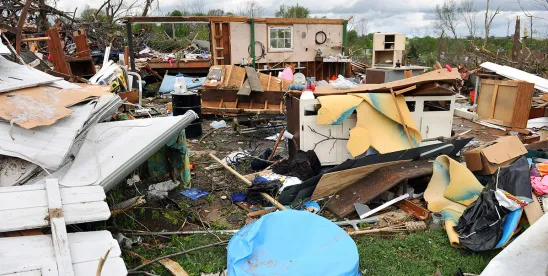The 2025 Atlantic hurricane season began on June 1, and the TSR (Tropical Storm Risk) forecast is for 8 hurricanes, of which 4 may be intense, and 16 tropical storms. This season is forecasted to exceed the statistical norms.
In weathering these storms, many businesses will face property damage, often accompanied by loss of income. Most commercial property policies incorporate business interruption coverage and extra expense insurance. The complexity of a business interruption claim, however, combined with the disruption of cash flow to pay continuing expenses creates a difficult scenario for business owners in these situations.
In general, lost profits and extra expenses may be covered if they are caused by physical damage to covered property and other covered conditions such as damage to a “dependent business” or an evacuation order, among others. Your insurance policy will define the parameters of coverage, and limit coverage for certain losses, such as for power loss occurring outside the covered property.
The following “golden rules” are intended to provide some guidance in the preparation of a business interruption insurance claim:
- Report the claim immediately and keep copies of all correspondence. Delay in reporting a claim may jeopardize your coverage for a claim, especially in Georgia. Check your policy to determine the manner in which a claim must be reported, and copy your agent or broker.
- Thoroughly examine and document all physical damage. Physical damage to covered property is usually the trigger for business interruption coverage. Do not rely on the insurer to document the condition of the property; photograph and document all damage in detail and get your own detailed estimate of repairs before any remedial work is performed. A construction expert can be critical in this situation. The damage may be greater than the untrained eye can detect. If the insurer believes part of the loss resulted from a non-covered risk, the need for a skilled independent expert becomes greater.
- Act as though you have no coverage. You have a duty to mitigate losses, and acting as though the coverage does not exist is the best approach in the initial stages. After the insurer investigates the claim and provides their position on the extent of coverage, you can partner with the insurer in committing to expensive repairs, such as whether to replace a damaged roof or tear down and rebuild.
- Know your policy. An insured will maximize recovery only by tailoring the claim to the insurance policy. Attention must be given to the forms of coverage provided, covered locations, covered causes of loss, exclusions, and the methodology for loss calculation. Identify your “business operations,” potential coverage problems, and the strongest arguments for recovery.
- Keep your eye on ancillary coverages. Categorize and submit for reimbursement all covered expenses in addition to business interruption losses; this includes extra expenses, expediting expenses, debris removal, and expenses relevant to other additional coverages, which vary from policy to policy.
- Assemble a team. A business interruption claim is often more complex — and calls for greater forensic work — than a property damage claim. The undertaking is best tackled by a team of people with distinct skill sets — including accounting, legal, insurance, and construction. A single, highly regarded manager should be selected as team lead. This manager should direct, communicate, and coordinate. An accountant who truly understands your business is critical. Your insurance broker, who has an existing relationship with the insurer, is often the best conduit of information as the claim is handled. A contractor experienced in loss assessment who speaks the language of insurers can help convince the insurer’s adjuster about the extent of the damage. And depending on the claim, other experts may be warranted, such as an insurance consultant, a structural engineer, or an architect.
- Teach the insurer about your business. You know your business best and can help maximize your recovery by teaching the insurer about your operations and putting the losses into the proper perspective. An examination by someone who does not understand your business is more likely to be superficial and may result in a lower reimbursement. Your team’s ultimate goal is presenting a claim that can be understood by a complete outsider.
- Present your case to the insurer. Do not rely on the insurer to tell you what your losses are, as it may not understand the business the way you do. Do not limit your claim by merely responding to the insurer’s questions and filling out its forms. Present your losses as you or your accountant understand them, taking into consideration the terms of the policy. Be prepared to fully document the losses, including a projection of the amount of business income lost and the amount and nature of expenses due to the damage.
- Communicate frequently with the insurer. Let the insurer or its adjuster know about the day-to-day demands the loss has caused — the need for cash for operations, the need to repair property or equipment, and/or other demands you face. Business interruption coverage generally extends at least until the “period of restoration” concludes, which is typically when the underlying property has been repaired or replaced, or when such repair or replacement can be accomplished with reasonable diligence. Some policies provide “extended business income” coverage, which provides additional coverage for a certain period of time while the business is recovering after the end of the “period of restoration.”
- Watch the clock; there are limitations on the length of time of coverage for a business interruption. Repairs can take months, especially when there is widespread damage in the area and contractors and building materials are in short supply. But your policy also contains a limitation on the length of time your business is interrupted, so keep an eye on your progress.
- Be prepared to take a hard line when necessary. If you disagree with the insurer’s handling of the claim, speak up. Know the deadlines imposed by law on the insurer and on you by the policy. If the claim is being mishandled, speak up in terms that are civil but firm, and be prepared to take a more aggressive position if the insurer does not respond as you believe it should. Keep in mind from the outset that your claim submittal must stand up in court, if necessary.
Preparation of a business interruption claim is a complex task that requires significant time and effort. Following these golden rules can help business owners prepare a successful business interruption claim.





 />i
/>i
